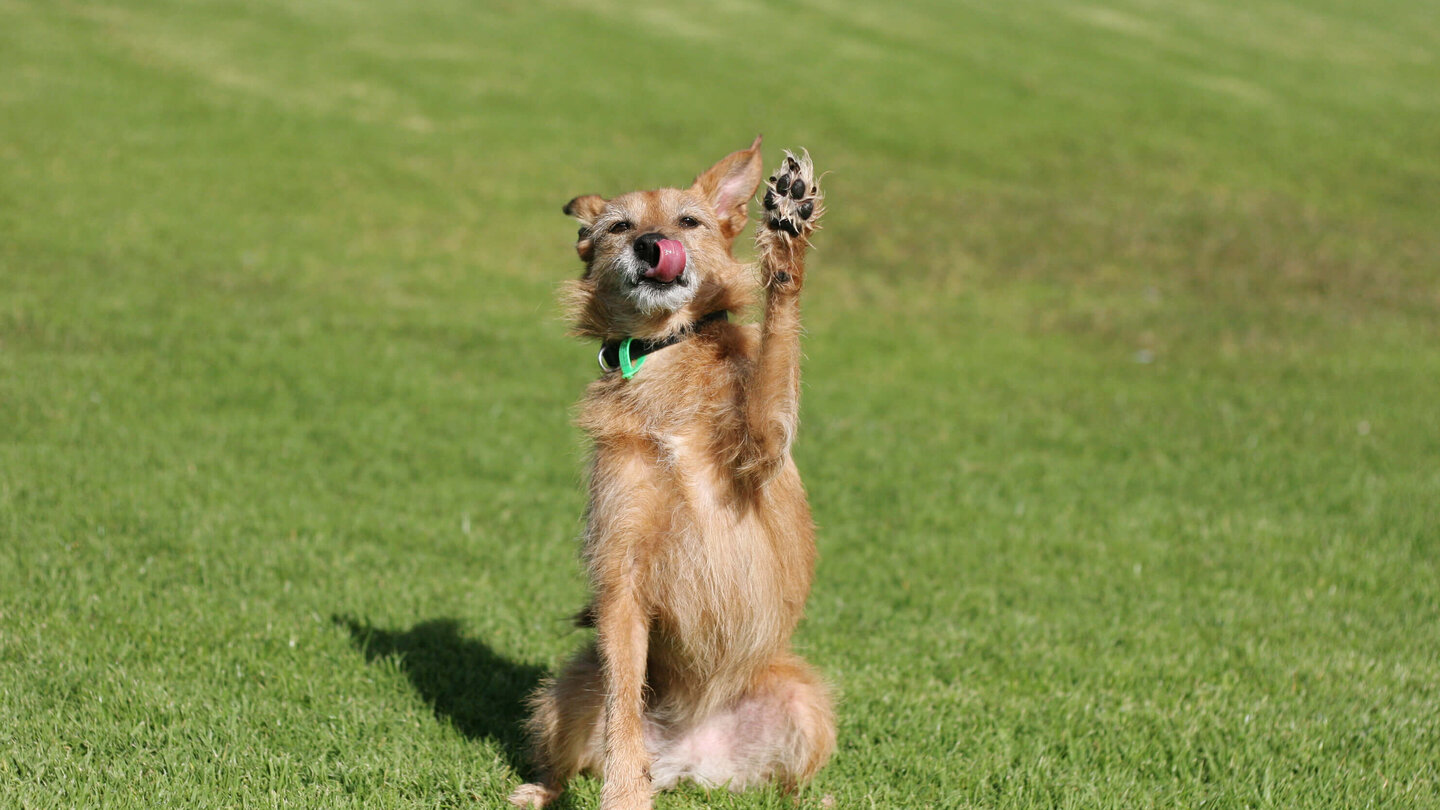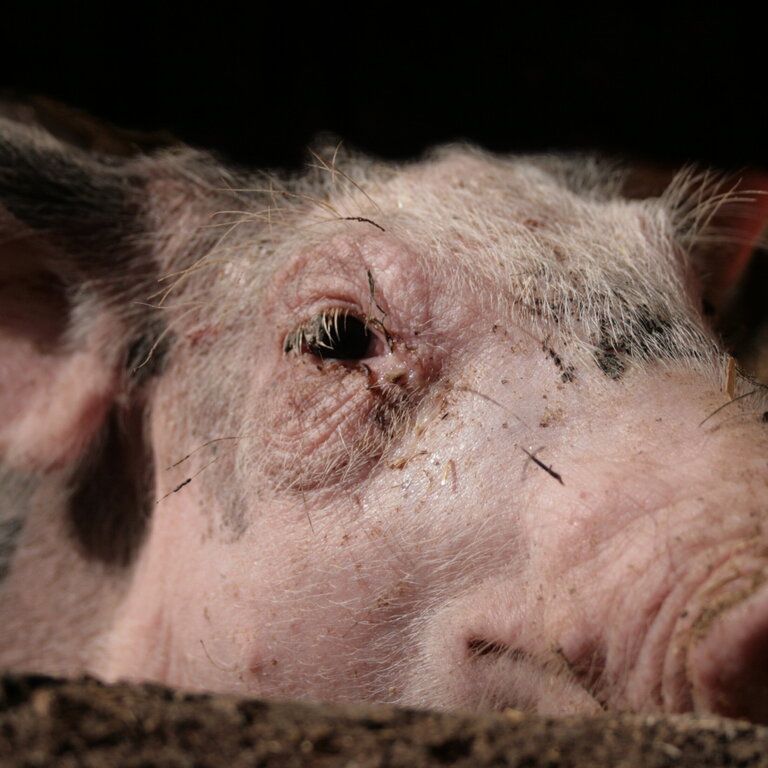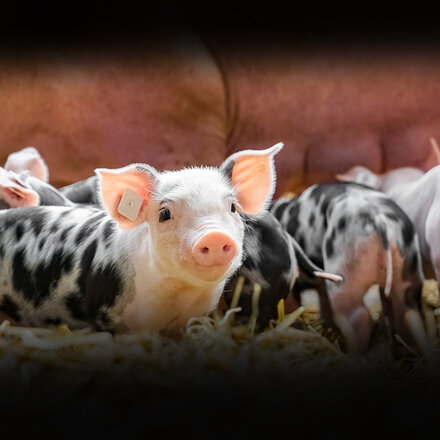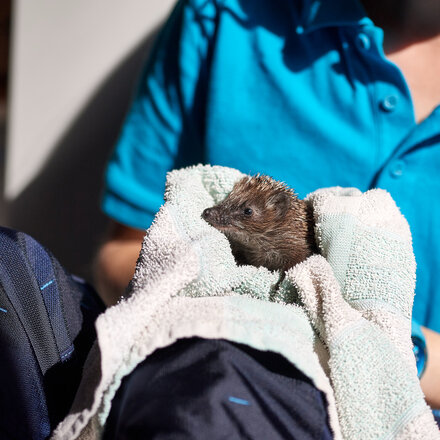Why the 2024 European elections are important for animal welfareEuropean elections 2024
The European elections will take place in Germany on June 9, 2024. But what is behind it and why is this election so important for animal welfare? You can find the background to the election, our demands and our commitment to greater animal welfare at EU level here.
Why is the election important for animal welfare?
The term of office of the EU Commission and the European Parliament ends with the European elections in 2024. However, legislative projects can be maintained at EU level and work can continue on the existing texts. A new work program for the term of office will be defined after the election. Animals depend on every single new member of the Parliament and the Commission who is committed to greater animal protection to ensure that the current legislative proposals are pursued. As the most populous EU member state, Germany has the most MEPs - and therefore also the greatest influence on animal welfare.
The EU Commission and the European Parliament have just presented two drafts proposing legislative changes in the pet and animal transport sectors. However, they still need to be revised and brought into force. In addition, further drafts on the topics of labeling, slaughter regulations and the keeping of farmed animals are still pending, on which nothing has been published to date despite announcements.
Questions about the European elections
All German citizens can vote in the European elections. People who are citizens of another EU country and live in Germany can also vote in Germany. For the first time, the European elections are also open to voters aged 16 and over.
Members of the European Parliament are elected in the European elections. The Parliament in turn elects the European Commission.
There is a polling station in your town or district where you can vote. The address can be found on the election notification you receive by post. As with other elections, you can also apply to vote by post. The voting documents will then be sent to you and you can vote from the comfort of your own home.
What the German Animal Welfare Federation does
The German Animal Welfare Federation is a founding member of Eurogroup for Animals, the European umbrella organization for animal welfare. Together with the local animal welfare organizations of the other EU countries, we are committed to a better life for all animals in Europe. In doing so, we are involved at a professional, political and communicative level. Since 2022, we have also had our own office in Brussels for even more intensive lobbying on the ground.
There, we take part in conferences and meetings and exchange ideas with the German members and staff of the European Parliament, the European Commission, the Permanent Representation of the Federal Republic of Germany, the state representations and other German NGOs. We actively work to ensure that these members, as well as members of the German Federal Government - for example Cem Özdemir (Federal Minister of Food and Agriculture) - vote in the interests of animals and place animal welfare on the agenda. To this end, we formulate concrete demands in a wide variety of areas. You can read about these below.
This must change for the animalsOur political demands
We demand:
- the revision of EU animal welfare legislation
- an upgrading of animal welfare by a Commissioner for Animal Welfare
We demand:
- an end to all manipulation of animals - both farm animals and pets. If manipulations are carried out, this must be done under analgesia, e.g. in justified individual cases or if animals can thus be given a more animal-friendly environment (e.g. grazing of male cattle)
- the prompt abolition of all cruel husbandry systems such as cages, crates and tethers
- specific requirements for an animal-friendly husbandry environment for all farmed animal species, which fulfills the species-specific needs and enables well-being. The EU animal welfare legislation should be supplemented to include the missing animal species and types of use. Series-produced animal housing systems or facilities must be tested and approved
- A licensing requirement for all agricultural businesses that keep animals and annual inspections to check whether they are keeping animals in accordance with the requirements. Animal-related criteria should be collected in order to identify and eliminate management-related shortcomings
- Mandatory expertise and regular training for all keepers of agricultural animals
- the identification and recording of all fallen stock and mandatory official inspections of animal welfare-relevant findings in rendering plants
- a ban on the use of veterinary medicinal products without a therapeutic indication with the aim of increasing performance (e.g. use of hormones in breeding sows)
- a Europe-wide ban on foie gras production in ducks and geese
- a Europe-wide end to the killing of chicks, with the restriction of sex determination in eggs to painless methods and EU-wide regulations on the rearing of brother cocks
- a focus on the rearing of dual-purpose chickens
- land-based animal husbandry
- a general reduction in animal husbandry and the associated consumption of animal products
- the application of the husbandry conditions and bans mentioned here to imports from third countries into the EU and thus the consistent consideration ofthe issues in the negotiation of new free trade agreements and the expansion of financial support for animal-friendly forms of husbandry (revision of the CAP)
We demand:
further measures to ban cage farming at EU level
We demand:
that the EU Animal Transport Regulation 1/2005 be amended, particularly with regard to the requirements for space, rest periods and temperatures. The individual animal species, directions of use and weight classes must be taken into account. At least the EFSA recommendations of June 2022 must be implemented. As long as the regulation has not yet been revised, it must be ensured that its provisions are complied with.Checks must be carried out frequently and violations must be punished consistently. This requires a list of sanctions.
that enforcement, controls and sanctions in the member states are uniformly strict must be uniformly strict
that the exchange of information between Member States is improved
that unweaned calves, lambs and kids are transported for a maximum of eight hours
that cattle are no longer transported in double-decker trucks
that the transport time for international transports in the EU and third countries must not exceed eight hours
that the ban on overhead transport of poultry is fully implemented and that the transport time for poultry transports may also be a maximum of eight hours
that transportation on ships is no longer permitted
that the transportation of animals for slaughter or breeding to third countries outside Europe is prohibited
We demand:
- that the following be taken into account in the revision of EU Slaughter Regulation 1099/2009:
- waterbath stunning of poultry must be banned in the near future
- all slaughterhouses, regardless of the number of animals slaughtered, must set up video inspections
- all slaughterhouses must have an animal welfare officer who updates their knowledge annually through further training
- restraining and stunning equipment must be tested and approved by an independent body
- the requirements of the Slaughtering Ordinance regarding current parameters, gas concentrations, dwell times, stun-to-stick interval and bleeding time must be specified and defined for the respective animal species, direction of use or weight class
We demand:
an EU-wide ban on fur farms
an EU-wide trade ban on products from fur farms
We demand:
an EU-wide ban on wild animals in circuses to adequately address the suffering of wild animals and ensure public safety
We demand:
- that the EU maintain its current position on wolves and large carnivores and their protected status
- that the member states are encouraged to implement and enforce more support programs for herd protection measures for all animal species
We demand:
- Binding and animal welfare-oriented guidelines for the management of species listed as invasive and alien, including "Capture - Neutering - Release"
- a standardized approach to dealing with invasive species at EU level
- a stronger focus on prevention and precaution instead of killing and eradication
We demand:
EU-wide, uniform, concrete regulations regarding the keeping, stunning and killing of fish and other aquaculture species that ensure animal welfare
an improvement in animal welfare in fisheries and implementation of the Presidential Conclusions of the European Council on the Common Fisheries Policy, see § 56
an EU-wide ban on the keeping of cephalopods (cephalopods) in aquaculture
We demand
that the sale of live animals over the internet and the shipping of live animals be prohibited
that the anonymity of traders on the internet is removed (e.g. through mandatory registration of sellers with the authorities/portals with their address, full name and proof of permission to trade in animals)
We call for
- the support of cross-border cooperation between the EU member states concerned
- the introduction of mandatory Europe-wide identification and registration of dogs and cats to enable traceability
- curbing the illegal puppy trade by regulating the online trade in animals, in particular by establishing traceability (seller identification online in connection with labeled and registered animals)
We demand:
- the restriction of the trade in and keeping of wild animals (positive list for the EU)
- a ban on the import of wild-caught animals into the EU (in line with the ban on wild bird imports)
- the consistent implementation of international species and nature conservation agreements, with the extension that national protection requirements of other countries should also be observed (comparable to the Lacey Act in the USA), so that no animals may be imported into the EU from countries that are protected in their country of origin
We demand:
- the mandatory identification and registration of all dogs and cats in the EU (from the first owner/breeder)
- the networking of existing registration portals so that animals can be traced throughout Europe
We demand:
- EU-wide legislation on the sustainable and humane treatment of street animals
We demand:
- EU-wide legislation with a general ban on torture breeding, specifying which physical and psychological traits are classified as torture breeding
We demand
the development of a directive to improve the protection of horses and equine species (breeding, keeping and handling)
We demand:
- a ban on the production, marketing and use of PMSG (Pregnant Mare Serum Gonadotropin)
We call for
the development and implementation of an EU-wide strategy to phase out animal testing
the restructuring of the distribution of funding (animal-free research with the highest priority, animal testing with the lowest)
concrete time targets for when animal experiments are to be replaced by non-animal methods in the areas of safety testing of substances and products, (basic) research and teaching
a review and revision of the EU Animal Experiments Directive to include improvements for animal welfare and reflect the current state of science (in the area of alternative methods)







